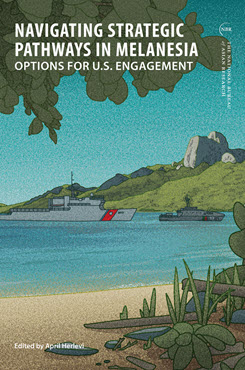Essay in NBR Special Report 110
Pacific Islands Narratives and Religion as a Bridge
This essay examines how and why Pacific Island countries use narratives to assert their agency amid geopolitical rivalries in their region.
EXECUTIVE SUMMARY
MAIN ARGUMENT
Pacific Island leaders understand that heightened interest and reinvigorated diplomacy in their region are closely related to China’s rise in the 21st century and the escalation of great- power competition. The U.S. Indo-Pacific strategy can be thought of as a U.S. narrative for this contest. But the success of this strategy in the Pacific Islands region may be determined by how well it intersects with the narratives of regional countries. The operative word is “intersects.” Geopolitical interests have crowded the region and created new dynamics in international relations at both the bilateral and multilateral levels. In the Pacific Islands Forum, the Blue Pacific narrative is used to express the collective interests of member countries’ vision for the region. One indication that Washington is paying attention to Pacific leaders is the partial alignment of the Indo-Pacific strategy with this vision. However, the substance of this alignment may not be known for at least another five years. The U.S. should not focus on reacting to China or trying to outmaneuver what Beijing is doing through its own Belt and Road Initiative narrative. Instead, the U.S. should focus on building meaningful long-term relationships with the people within the region through listening to their narratives.
POLICY IMPLICATIONS
- If the U.S. desires to achieve its Indo-Pacific strategy in the Pacific Islands region, then it will need to first rebuild trust in its relationships with regional countries. The offering of carrots in a transactional sense will not be effective in achieving this goal.
- If the U.S. makes a genuine effort to align its policies on climate change with the narratives of Pacific Island countries, then this could nurture the security partnerships sought after in the region.
- Religion is an underutilized bridge between Western countries and the Pacific Islands. This diplomatic tool could help develop long-term relationships if it is employed sincerely—not just at the state level but through people-to-people dialogue.
William Waqavakatoga is a PhD Candidate in Politics and International Relations at the University of Adelaide. He previously was a teaching assistant at the University of the South Pacific and a broadcast journalist in Fiji. He is a British Army veteran.


